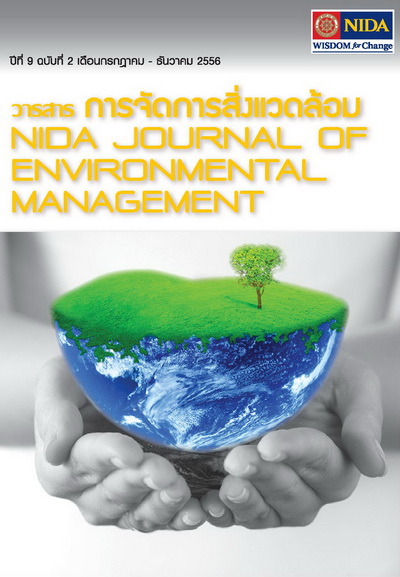การนำมาตรการทางกฎหมายสิ่งแวดล้อมทางทะเลมาใช้ในการป้องกันและปราบปรามการค้าน้ำมันเถื่อน ในเขตทางทะเลของประเทศไทย
บทคัดย่อ
บทคัดย่อการ ค้าน้ำมันเถื่อนในเขตทางทะเลของประเทศไทยส่งผลกระทบต่อการจัดเก็บภาษีของรัฐ และยังก่อให้เกิดความเสี่ยงต่ออุบัติการณ์ทางทะเลอันมีผลกระทบต่อความหลาก หลายทางชีวภาพและความยั่งยืนของทรัพยากรธรรมชาติในท้องทะเล ในขณะที่มาตรการทางกฎหมายที่ใช้ในการป้องกันและปราบปรามการลักลอบค้าน้ำมัน เถื่อนในปัจจุบันของประเทศไทยมีขอบเขตบังคับใช้อยู่ไม่เกินไปกว่าเขตต่อ เนื่องเท่านั้น การขยายอำนาจรัฐในการป้องกันและปราบปรามการลักลอบค้าน้ำมันเถื่อนออกไปใช้ บังคับได้ถึงในเขตเศรษฐกิจจำเพาะสามารถดำเนินการได้โดยอาศัยมาตรการทาง กฎหมายสิ่งแวดล้อมทางทะเลเป็นฐานการใช้อำนาจของพนักงานเจ้าหน้าที่เกี่ยวกับ การป้องกันการลักลอบค้าน้ำมันเถื่อนได้อีกประการหนึ่ง จากการศึกษาพบว่าประเทศไทยยังไม่มีกฎหมายที่เกี่ยวกับการป้องกันความเสียหาย จากมลพิษน้ำมันที่เกิดจากเรือเดินทะเลเพื่อใช้บังคับในเขตเศรษฐกิจจำเพาะของ ประเทศไทย ในขณะที่อนุสัญญาสหประชาชาติว่าด้วยกฎหมายทะเล ค.ศ. 1982 กำหนดให้ประเทศไทยในฐานะรัฐชายฝั่งต้องประกันว่ากิจกรรมทั้งหลายที่เกิดขึ้น ในเขตเศรษฐกิจจำเพาะของประเทศไทยจะต้องไม่ก่อให้เกิดความเสียหายด้านสิ่งแวด ล้อมทางทะเลต่อรัฐภาคีอื่นใด อีกทั้งอนุสัญญาระหว่างประเทศเพื่อการป้องกันภาวะมลพิษจากเรือ ค.ศ.1973 และพิธีสารเกี่ยวกับการป้องกันภาวะมลพิษจากเรือ ค.ศ.1983 หรือ MARPOL 73/78 กำหนด ให้ประเทศไทยในฐานะรัฐภาคีต้องดำเนินการต่อเรือของรัฐภาคีตามพันธกรณีที่มี ในอนุสัญญาเกี่ยวกับมลพิษน้ำมันที่เกิดจากการปฏิบัติการของเรืออันมีผลกระทบ ต่อสิ่งแวดล้อมทางทะเลในฐานะที่เป็นรัฐเจ้าของสัญชาติเรือที่จดทะเบียน ประเทศไทยจึงควรปรับปรุงกฎหมายภายในเพื่อใช้ในการปกป้องและคุ้มครองสิ่งแวด ล้อมทางทะเลตามพันธรกรณีระหว่างประเทศ และสามารถมาตรการทางกฎหมายสิ่งแวดล้อมทางทะเลมาใช้ในการป้องกันและปราบปราม การลักลอบค้าน้ำมันเถื่อนในเขตทางทะเลของประเทศไทย
คำสำคัญ: น้ำมันรั่วไหล; มลพิษทางทะเล; น้ำมันเถื่อน
Abstract
Oil smuggling in the maritime zones in Thailand is a serious problem in terms of pollution and customs duty payment. Vessel-source oil spills can occur at any time and have an impact upon biological diversity and sustainable marine natural resources. In fact, legal measures for anti-oil smuggling in Thai maritime zones are not the beyond contiguous zone, which extends seaward up to 24 nautical miles from its baseline. At the same time, a marine pollution legal regime is one of the legal measures that can be used for anti-oil smuggling in the exclusive economic zone of Thailand. Therefore, laws and regulations are now needed to avoid these problems. The objective of this work is to study marine pollution principles as well as pertinent domestic laws to analyze whether and how legal principles and laws can deal with the anti-oil smuggling in the Thai maritime zones. The research revealed that there are no laws or measures to prevent and protect the marine environment from vessel-source oil spills, especially in the exclusive economic zone (EEZ). This is inconsistent with article 194 of the United Nations Convention on the Law of the Sea 1982, which states that “costal states shall take all measures necessary to ensure that the activities under their jurisdiction or control are so conducted as not to cause damage by pollution to other states and their environment.” Moreover, the International Convention for the Prevention of Pollution from Ships, 1973, as modified by the Protocol of 1978 or MARPOL 73/78, also indicates that state parties shall ensure that vessels flying their flag will not cause marine environmental damage from vessel operation. As a result, Thailand, as a state party participating in international conventions, should pass marine environmental protection laws that meet international environmental standards and that can lead to a solution to the problems of oil smuggling in Thai maritime zones.
Keywords: Oil Spill; Marine Pollution; Oil smuggling



